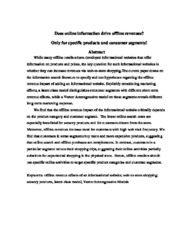Does online information drive offline revenues? Only for specific products and consumer segments!
| dc.contributor.author | Pauwels, Koen Hendrik | |
| dc.contributor.author | Leeflang, P. S. H. | |
| dc.contributor.author | Teerling, M. L. | |
| dc.contributor.author | Huizingh, K. R. E. | |
| dc.date.accessioned | 2012-05-24T11:42:55Z | |
| dc.date.available | 2012-05-24T11:42:55Z | |
| dc.date.issued | 2011-03 | |
| dc.identifier.issn | 0022-4359 | |
| dc.identifier.uri | http://hdl.handle.net/10679/167 | |
| dc.identifier.uri | http://www.sciencedirect.com/science/article/pii/S0022435910000771 | |
| dc.description.abstract | While many offline retailers have developed informational websites that offer information on products and prices, the key question for such informational websites is whether they can increase revenues via web-to-store shopping. The current paper draws on the information search literature to specify and test hypotheses regarding the offline revenue impact of adding an informational website. Explicitly considering marketing efforts, a latent class model distinguishes consumer segments with different short-term revenue effects, while a Vector Autoregressive model on these segments reveals different long-term marketing response.We find that the offline revenue impact of the informational website critically depends on the product category and customer segment. The lower online search costs are especially beneficial for sensory products and for customers distant from the store. Moreover, offline revenues increase most for customers with high web visit frequency. We find that customers in some segments buy more and more expensive products, suggesting that online search and offline purchases are complements. In contrast, customers in a particular segment reduce their shopping trips, suggesting their online activities partially substitute for experiential shopping in the physical store. Hence, offline retailers should use specific online activities to target specific product categories and customer segments. | en_US |
| dc.description.sponsorship | Nederlandse Organisatie voor Wetenschappelijk Onderzoek (NWO) | |
| dc.language.iso | eng | en_US |
| dc.publisher | Elsevier | en_US |
| dc.relation.ispartof | Journal of Retailing | |
| dc.rights | openAccess | |
| dc.title | Does online information drive offline revenues? Only for specific products and consumer segments! | en_US |
| dc.type | Article | en_US |
| dc.description.version | pre-print | |
| dc.peerreviewed | yes | en_US |
| dc.publicationstatus | published | en_US |
| dc.contributor.department | Özyeğin University | |
| dc.contributor.authorID | (ORCID & YÖK ID 141722) Pauwels, Koen | |
| dc.contributor.ozuauthor | Pauwels, Koen Hendrik | |
| dc.identifier.volume | 87 | |
| dc.identifier.issue | 1 | |
| dc.identifier.startpage | 1 | |
| dc.identifier.endpage | 17 | |
| dc.identifier.wos | WOS:000289923000001 | |
| dc.identifier.doi | 10.1016/j.jretai.2010.10.001 | |
| dc.subject.keywords | Offline revenue effects of an informational website | en_US |
| dc.subject.keywords | Web-to-store shopping | en_US |
| dc.subject.keywords | Sensory products | en_US |
| dc.subject.keywords | Latent class model | en_US |
| dc.identifier.scopus | SCOPUS:2-s2.0-79952816945 | |
| dc.contributor.authorMale | 1 | |
| dc.relation.publicationcategory | Article - International Refereed Journal - Institutional Academic Staff |
Files in this item
This item appears in the following Collection(s)
Share this page



